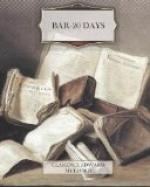On his way south he met and talked with men who had known him, the old Tex, in the days when he had made his living precariously. They did not recognize him behind his beard, and he was content to let the oversight pass. But from these few he learned what he wished to know, and he was glad that Hopalong Cassidy was where he had always been, and that his gun-work had improved rather than depreciated with the passing of time. He wished to prove himself master of The Master, and to be hailed as such by those who had jeered and laughed at his ignominy several years before. So he rode on day after day, smiling and content, neither under-rating nor over-rating his enemy’s ability with one weapon, but trying to think of him as he really was. He knew that if there was any difference between Hopalong Cassidy and himself that it must be very slight—perhaps so slight as to result fatally to both; but if that were so then it would have to work out as it saw fit—he at least would have accomplished what many, many others had failed in.
In the little town of Buckskin, known hardly more than locally, and never thought of by outsiders except as the place where the Bar-20 spent their spare time and money, and neutral ground for the surrounding ranches, was Cowan’s saloon, in the dozen years of its existence the scene of good stories, boisterous fun, and quick deaths. Put together roughly, of crude materials, sticking up in inartistic prominence on the dusty edge of a dustier street; warped, bleached by the sun, and patched with boards ripped from packing cases and with the flattened sides of tin cans; low of ceiling, the floor one huge brown discoloration of spring, creaking boards, knotted and split and worn into hollows, the unpretentious building offered its hospitality to all who might be tempted by the scrawled, sprawled lettering of its sign. The walls were smoke-blackened, pitted with numerous small and clear-cut holes, and decorated with initials carelessly cut by men who had come and gone.




